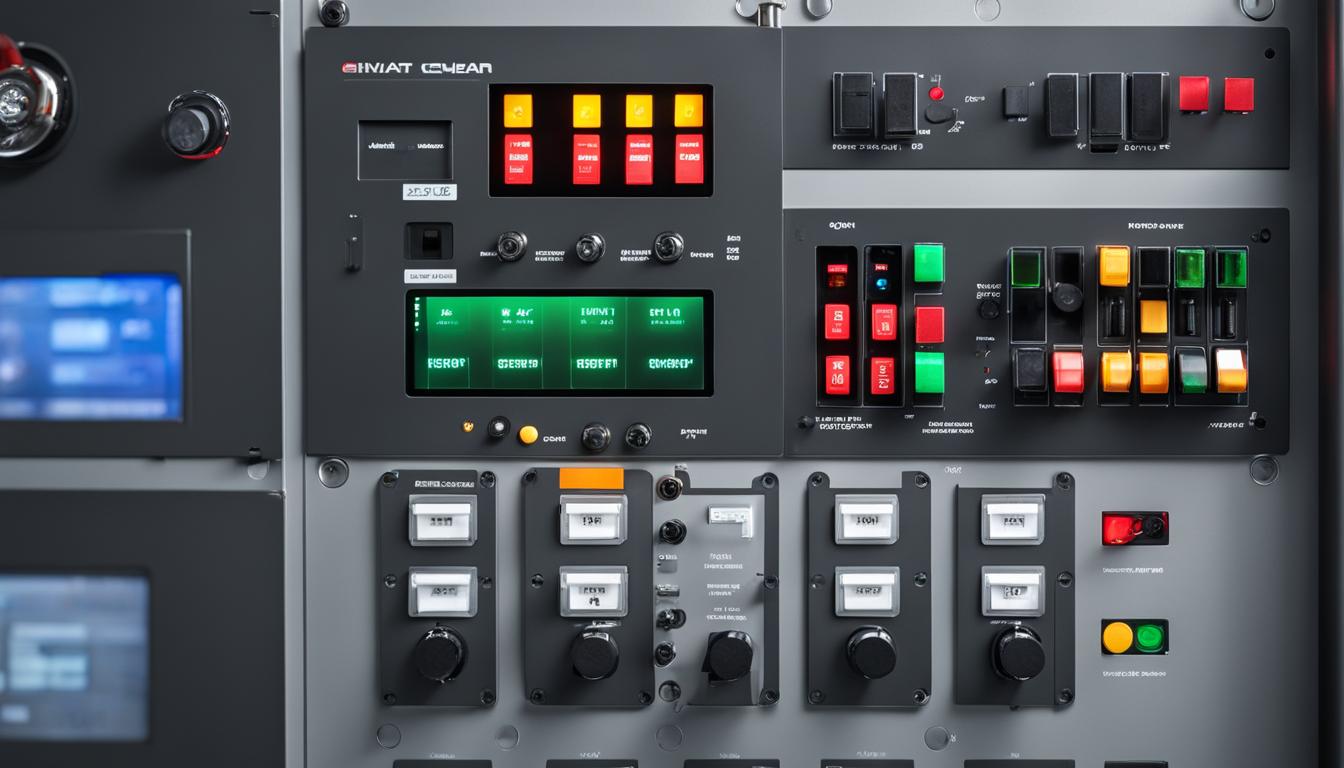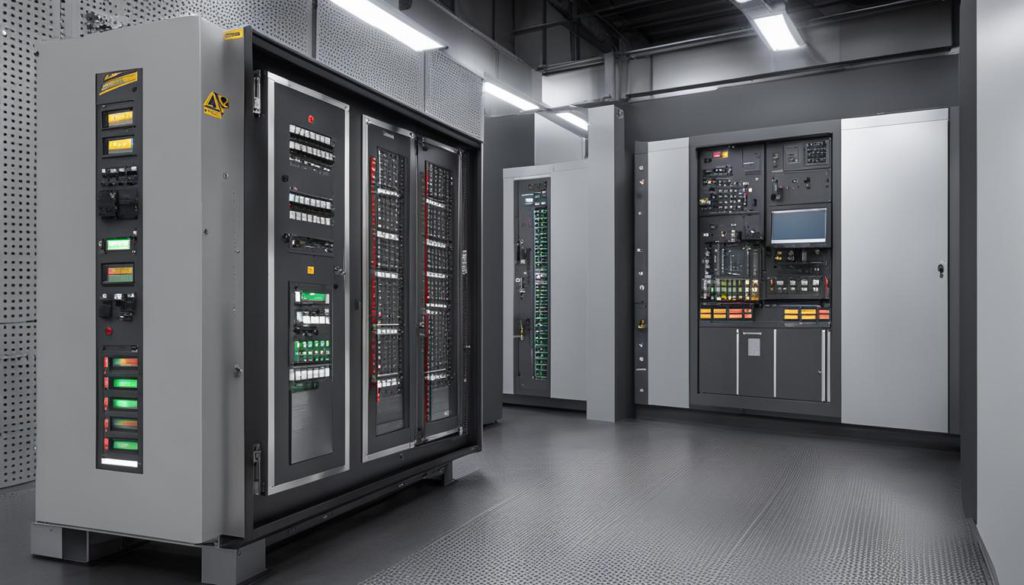
Date
- 13.12.23
Industrial Control Panel | Smart Main Panel System
An industrial control panel plays a crucial role in controlling and automating various industrial processes. It consists of electrical devices that use electrical power to control the mechanical functions of industrial equipment or machinery. The panel structure includes an enclosure made of aluminum or stainless steel and a back panel that provides support for wiring and mounting devices. The electrical components within the control panel include main circuit breakers, surge arresters, transformers, terminal blocks, programmable logic controllers (PLCs), relays and contactors, network switches, and human-machine interfaces (HMIs). These components work together to monitor and control the mechanical processes in industrial production equipment. Custom electrical control panels can be designed to meet specific industry requirements, providing advanced operation, universal control, and improved human-machine interfaces.
Key Takeaways:
- An industrial control panel is essential for controlling and automating industrial processes.
- The panel structure includes an enclosure and various electrical components.
- Custom electrical control panels can be designed to meet specific industry requirements.
- Main components within the control panel include PLCs, relays, contactors, and HMIs.
- Industrial control panels provide advanced operation, universal control, and improved human-machine interfaces.
Types of Industrial Control Panels
When it comes to industrial automation, there are several types of control panels that play a crucial role in controlling and monitoring industrial processes. These control panels are designed to meet specific industry requirements and provide advanced functionalities. Let’s take a closer look at some of the most common types of industrial control panels:
1. Programmable Logic Controllers (PLCs)
PLCs are widely used in industrial automation and are key components of control panels. They are programmable devices that use software programs to control and automate tasks within industrial processes. PLCs are known for their reliability, flexibility, and ability to handle complex tasks. They can be easily programmed and integrated with other devices, making them an essential part of control system integration.
2. Human-Machine Interfaces (HMIs)
HMIs provide operators with an interface to interact with industrial equipment and monitor the status of processes. They are often equipped with touchscreens and graphical displays, allowing users to view real-time data, configure settings, and troubleshoot issues. HMIs enhance the user experience by providing intuitive and user-friendly interfaces for controlling and monitoring industrial processes.
3. SCADA Systems
SCADA (Supervisory Control and Data Acquisition) systems are used for monitoring and controlling large-scale processes. They collect real-time data from various sensors and devices and provide operators with a comprehensive view of the entire system. SCADA systems allow for remote monitoring and control, providing operators with the ability to make informed decisions and quickly respond to anomalies or emergencies.
4. Distributed Control Systems (DCS)
DCSs are designed to control complex industrial processes and consist of multiple control units distributed throughout the system. These control units communicate with each other to coordinate and manage the overall operation of the industrial process. DCSs are commonly used in industries such as oil and gas, power generation, and manufacturing, where precise control and coordination are critical.
These are just a few examples of the types of industrial control panels available for industrial automation. Each type has its own advantages and is suited for specific applications. Choosing the right control panel depends on factors such as the complexity of the system, industry requirements, and budget constraints. It is important to consult with control panel specialists to ensure the selection of the most suitable panel for your specific needs.
Benefits of Industrial Control Panels
Industrial control panels offer numerous benefits for industrial automation. They enhance efficiency and precision in industrial processes, reducing the need for manual labor. By automating tasks and providing real-time monitoring, control panels improve safety and reliability in industrial equipment. They also enable remote monitoring and control, allowing operators to track and troubleshoot issues easily. Customized control panel designs can be tailored to specific industry requirements. The use of industrial control panel enclosures ensures the safety and protection of electrical components. Electrical control boards within the panels facilitate organized and reliable distribution of power and signals.
Some of the key benefits of industrial control panels include:
- Enhanced Efficiency: Industrial control panels automate processes, reducing the time and effort required for manual tasks. This improves overall efficiency in industrial production.
- Precision Control: Control panels provide precise control over industrial processes, ensuring consistent and accurate results.
- Improved Safety: By automating tasks and implementing safety measures, control panels enhance the safety of industrial equipment and reduce the risk of accidents.
- Remote Monitoring and Control: Control panels enable remote monitoring and control of industrial processes, allowing operators to track performance and make adjustments from a central location.
- Customization: Industrial control panels can be customized to meet specific industry requirements, providing tailored solutions for different applications.
Overall, industrial control panels play a crucial role in optimizing industrial processes, improving efficiency, and ensuring the safe and reliable operation of equipment.
Examples of Industrial Control Panel Enclosures
Industrial control panel enclosures are designed to provide protection for the electrical components within the control panel. They are made from durable materials such as aluminum or stainless steel and are built to withstand harsh industrial environments. These enclosures offer benefits such as:
- Protection from Dust and Debris: Industrial control panel enclosures prevent dust and debris from entering the panel, reducing the risk of component damage and malfunction.
- Protection from Moisture and Humidity: Enclosures with proper sealing protect electrical components from moisture and humidity, preventing corrosion and ensuring reliable performance.
- Temperature Regulation: Some enclosures are equipped with cooling or heating systems to maintain optimal operating temperatures for the electrical components.
- Security: Enclosures can be designed with locks or access control features to prevent unauthorized access to sensitive control panel equipment.
Industrial control panel enclosures are available in various sizes and configurations to accommodate different panel designs and industry requirements. They play a vital role in ensuring the longevity and functionality of control panels in industrial settings.
| Benefit | Description |
|---|---|
| Enhanced Efficiency | Automation of tasks reduces manual labor and improves overall efficiency in industrial production. |
| Precision Control | Control panels provide precise control and ensure consistent and accurate results in industrial processes. |
| Improved Safety | Automation and safety measures enhance the safety of industrial equipment and reduce the risk of accidents. |
| Remote Monitoring and Control | Operators can monitor and control industrial processes remotely, making adjustments from a central location. |
| Customization | Control panels can be customized to meet specific industry requirements, providing tailored solutions. |

Choosing the Right Industrial Control Panel
When it comes to selecting the right industrial control panel for your specific application and industry requirements, there are several factors to consider. The size and complexity of the system, budget constraints, and the need for advanced features all play a role in making the best decision. To ensure you make the right choice, it’s advisable to consult with control panel specialists who can provide expert guidance and recommendations.
Control panel solutions are available for a wide range of industries, including food and beverage, oil and gas, pharmaceuticals, power generation, manufacturing, fluid handling, and material handling. Each industry has unique demands and regulations that must be met, and working with specialists who understand these requirements can ensure that you choose a control panel that can effectively meet your needs.
Control panel specialists have extensive knowledge and experience in designing, manufacturing, and integrating control panels. They can help you navigate the complexities of control panel technology and provide solutions tailored to your specific industry and application. Additionally, they can assist with the installation and configuration of the control panel, ensuring that it is properly integrated into your existing systems and functions seamlessly.
By partnering with control panel specialists, you can have confidence in your control panel selection. Their expertise and industry-specific knowledge will ensure that you choose a control panel that maximizes efficiency, reliability, and safety in your industrial processes. So, when it comes to choosing the right industrial control panel, don’t underestimate the value of working with specialists who can provide the expertise and support you need.

Table: Key Considerations for Choosing an Industrial Control Panel
| Consideration | Description |
|---|---|
| Application | Identify the specific industrial process or equipment the control panel will be used for. |
| Industry | Understand the unique requirements and regulations of your industry to ensure compliance. |
| System Size | Evaluate the size and complexity of your system to determine the appropriate control panel size and capacity. |
| Features | Determine the desired features and functionality of the control panel, such as remote monitoring capabilities, advanced automation options, and connectivity. |
| Budget | Consider your budgetary constraints and balance it with the required performance and functionality. |
| Expertise | Engage with control panel specialists who have the knowledge and experience to guide you in selecting the right control panel. |
Conclusion
Industrial control panels play a crucial role in modern industry, enabling automation, control, and monitoring of various industrial processes. With their diverse types, including PLCs, SCADA systems, HMIs, and DCSs, these panels offer specific applications and advantages for different industries. The integration of control panels and the use of electrical control panels are key factors in managing industrial processes and optimizing performance.
Industrial control panels provide numerous benefits, such as improved efficiency, precision, safety, and reliability in industrial operations. By automating tasks, these panels enhance efficiency and reduce the need for manual labor. Real-time monitoring facilitates better control, ensuring safety and reliability in industrial equipment. Additionally, the ability to remotely monitor and control operations enables easy troubleshooting and enhances operational efficiency.
When choosing the right industrial control panel, it is crucial to consider specific application requirements as well as industry needs. System size, budget constraints, and the need for advanced features are important factors to take into account. Seeking professional consultation and installation services from control panel specialists can help you make informed decisions and ensure proper configuration and functioning of the control panels. Control panel integration and the use of electrical control panels contribute significantly to the smooth operation and optimized performance of industrial processes.
FAQ
What is an industrial control panel?
An industrial control panel is a system that controls and automates various industrial processes using electrical devices.
What components are included in an industrial control panel?
The components within an industrial control panel include main circuit breakers, surge arresters, transformers, terminal blocks, PLCs, relays and contactors, network switches, and HMIs.
What are the different types of industrial control panels?
There are several types of industrial control panels, including PLCs, HMIs, SCADA systems, DCSs, PACs, IPCs, and MCCs.
What are the benefits of industrial control panels?
Industrial control panels enhance efficiency, precision, safety, and reliability in industrial processes, while also enabling remote monitoring and control.
How do I choose the right industrial control panel?
When choosing an industrial control panel, it’s important to consider the specific application, industry requirements, system size, and budget. Consulting with control panel specialists can help in making the right choice.

